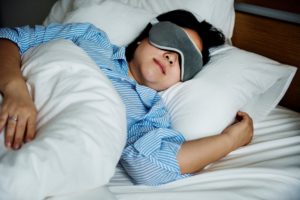When you buy through our links, we may earn a commission. Products or services may be offered by an affiliated entity. Learn more.
Dreams About Teeth Falling Out? 9 Possible Meanings
At a Glance
The most common interpretations for dreaming about your teeth falling out include:
If you’ve ever dreamed about your teeth falling out, you know how unsettling those dreams can be. According to a SleepFoundation.org survey, about 20% of people report having dreamed about their teeth falling out. However, this number varies by gender, with a larger percentage of women having had these dreams than men. It also varies by age: People 25 to 54 were more likely to have had a dream about their teeth falling out than younger or older adults.
But what (if anything) does dreaming about your teeth falling out mean? Below, we explore possible interpretations and what you can do if these dreams are bothering you.
Looking to improve your sleep? Try upgrading your mattress.
Possible Interpretations
In our survey, about 80% of participants said they believe that at least some dreams carry meaning. When it came to the “teeth falling out” dream, most respondents linked it to stress, a lack of control, or actual tooth pain. As it turns out, they may be right. Experts often cite these factors as possible explanations or interpretations for this unsettling dream.
Recent Loss or Grief
Many people believe that a vivid dream of teeth falling out can symbolize a recent loss of something important, like a job, relationship, or loved one. Teeth are essential and used daily to eat. If they fell out in waking life, that would be a traumatic event and serious loss. When they fall out in dream life, it might indicate that a person feels like they’ve lost something essential.
Researchers haven’t specifically studied if loss is associated with teeth-loss dreams. But, some believe that dreams take real-life experiences and represent them through emotional and figurative images, which gives credibility to the idea.
Jealousy
Because teeth are so essential, some people believe that dreaming about losing them may represent jealousy. Research has found that real-life envy can translate into dreams involving jealousy or sexual infidelity, but it doesn’t appear that researchers have studied a connection between jealousy and teeth-loss dreams yet.
Increased Stress or Anxiety
Since a dream about teeth falling out usually feels negative, it may indicate a person is under increased stress or experiencing a lot of anxiety. Generally, studies suggest that people experience more bad dreams and nightmares when they’re under stress. For example, people had more bad dreams — including teeth-loss dreams — at the start of the COVID-19 pandemic when lives were disrupted by lockdowns, social isolation was more common, and the future felt uncertain.
Lack of Control
Another popular interpretation of dreams that involve teeth falling out is that they represent a sense that a person is losing control. Some research does lend credibility to this idea. Many studies suggest that dreams can help people gain insight into their emotions, and having teeth fall out could feel like things are out of control. One study found that college students who had teeth-loss dreams were also more likely to feel a loss of control over their lives.
Big Life Changes
Many people have posited that teeth-loss dreams indicate a person is experiencing major life changes. While this concept hasn’t been studied by researchers, it could make sense. Many people lose their teeth twice as part of a major transition: once from early childhood into older childhood and again in older adulthood. Such transitions often feel jarring, which is why some people think teeth loss dreams are more likely to occur around transitions like a graduation or pregnancy.
Depression
Some people believe there’s a connection between depression and dreams about teeth falling out. The most recent research on dreams about teeth falling out hasn’t confirmed this connection, but that doesn’t mean it isn’t there for some people. A study from the 1980s found a link between the two, and nightmares have long been associated with psychiatric disorders, including depression . Beginning, taking, or withdrawing from different types of antidepressants can also cause nightmares, more intense dreams, or unusual dreams .
Insecurity or Shame
Teeth are central to a person’s appearance, so the loss of them in a dream may indicate insecurity or shame about personal attractiveness. Because teeth are so necessary to daily life, their loss in a dream could also signify insecurity about something else a person views as important but is afraid of losing or feels shame about.
Dream experts don’t appear to have studied the connection between teeth-related dreams, insecurity, and shame, so whether the dreams truly represent insecurity or shame for a large percentage of sleepers is yet to be determined.
Health-Related Fears
Another possible explanation for a dream of teeth falling out is that the dream represents a fear the person has about their health. Perhaps they suspect they’re getting sick or simply fear the future possibility of illness.
Researchers have found that dreams often represent health-related fears in more dramatic, metaphorical ways. For example, someone who fears catching a virus might dream about something that looks more dramatic, like teeth falling out or the body disintegrating into sand.
Dental Issues
Some researchers believe that people dream about their teeth falling out because they’re experiencing sensations in their teeth as they dream. Research has also found that real bodily sensations experienced during sleep made their way into people’s dreams in the form of pain.
Grinding Teeth
A person might feel sensations in their teeth while asleep because they’re grinding their teeth or clenching their jaw, which is common. More research is needed to figure out if other sensations felt in the teeth or gums might prompt teeth-loss dreams.
Dreams of teeth falling out have often been linked to stress or anxiety, which could also tie into the teeth sensations hypothesis. If stress leads to teeth grinding, then teeth grinding might be the reason stress leads to teeth-loss dreams. However, this hasn’t been widely studied, and one study found that dreams of losing teeth weren’t connected to psychological distress.
Poor Oral Hygiene
Some dentists have suggested that poor oral hygiene can prompt dreams about losing teeth. However, this isn’t a common interpretation or something dream researchers have studied. Theoretically, if poor oral hygiene causes cavities or other painful tooth or gum issues, physical pain during sleep or daytime worries about the teeth may prompt tooth-related dreams. Experts have noted that the relationship between dreams about teeth and dental pain, general pain, gum issues, and tooth or gum sensitivity should all be studied further.
Dreams About Someone Else Missing Teeth
Some people speculate that dreams about someone else losing their teeth could reflect worries the sleeper has about that person. But dream researchers haven’t studied this dream theme yet. Research that categorizes typical dreams only asks sleepers if they’ve dreamed about having their own teeth falling out, not if they’ve dreamt about someone else’s teeth falling out . This suggests that dreaming about other people’s teeth is much less common.
Why These Dreams Are So Common
Experts aren’t certain why dreams about teeth falling out are so common. Dream researchers have called these dreams “especially enigmatic,” which means particularly difficult to interpret, because they don’t align with the commonly held belief that much of what happens in dreams stems from waking life. Some experts theorize that sensations in the teeth or gums are likely what make these dreams so common, rather than their symbolic value, but more research is needed to know for sure .
What to Do if You Frequently Dream About Your Teeth Falling Out
Dreams about teeth falling out are common and, on their own, aren’t a reason to worry or take any particular action. But, if you experience recurring dreams about losing your teeth or experience distressing teeth-loss nightmares that are affecting your sleep, you might want to contact a professional.
A dentist could help you discover if your dreams of losing teeth stem from teeth grinding or other tooth or gum issues. A therapist could help you identify if you’re experiencing nightmares as a result of a mental health condition, like depression or an anxiety disorder.
There’s some evidence to suggest that improving sleep quality by practicing healthy sleep habits may reduce nightmares. Healthy sleep habits involve avoiding caffeine and alcohol in the evening, going to sleep and waking up around the same time each day, avoiding screens near bedtime, and sleeping in a dark, quiet room of a comfortable temperature.

Still have questions? Ask our community!
Join our Sleep Care Community — a trusted hub of product specialists, sleep health professionals, and people just like you. Whether you’re searching for the perfect mattress or need expert sleep advice, we’ve got you covered. Get personalized guidance from the experts who know sleep best.
References
9 Sources
-
Rozen, N., & Soffer-Dudek, N. (2018). Dreams of teeth falling out: An empirical investigation of physiological and psychological correlates. Frontiers in Psychology, 9, 1812.
https://pubmed.ncbi.nlm.nih.gov/30319507/ -
Shao, X., Wang, C., Jia, Y., & Wang, W. (2020). Sexual dream and family relationships in frequent sexual dreamers and healthy volunteers. Medicine, 99(36), e21981.
https://pubmed.ncbi.nlm.nih.gov/32899040/ -
Solomonova, E., Picard-Deland, C., Rapoport, I. L., Pennestri, M. H., Saad, M., Kendzerska, T., Veissiere, S. P. L., Godbout, R., Edwards, J. D., Quilty, L., & Robillard, R. (2021). Stuck in a lockdown: Dreams, bad dreams, nightmares, and their relationship to stress, depression and anxiety during the COVID-19 pandemic. PloS One, 16(11), e0259040.
https://pubmed.ncbi.nlm.nih.gov/34818346/ -
Šćepanović, S., Aiello, L. M., Barrett, D., & Quercia, D. (2022). Epidemic dreams: Dreaming about health during the COVID-19 pandemic. Royal Society Open Science, 9(1), 211080.
https://pubmed.ncbi.nlm.nih.gov/35116145/ -
Coolidge, F. L., & Bracken, D. D. (1984). The loss of teeth in dreams: An empirical investigation. Psychological Reports, 54(3), 931–935.
https://journals.sagepub.com/doi/abs/10.2466/pr0.1984.54.3.931 -
Akkaoui MA, Lejoyeux M, d’Ortho MP, Geoffroy PA. Nightmares in Patients with Major Depressive Disorder, Bipolar Disorder, and Psychotic Disorders: A Systematic Review. J Clin Med. 2020;9(12):3990. Published 2020 Dec 9. doi:10.3390/jcm9123990
https://pubmed.ncbi.nlm.nih.gov/33317105/ -
Tribl GG, Wetter TC, Schredl M. Dreaming under antidepressants: a systematic review on evidence in depressive patients and healthy volunteers. Sleep Med Rev. 2013;17(2):133-142. doi:10.1016/j.smrv.2012.05.001
-
Nielsen, T. A., McGregor, D. L., Zadra, A., Ilnicki, D., & Ouellet, L. (1993). Pain in dreams. Sleep, 16(5), 490–498.
https://pubmed.ncbi.nlm.nih.gov/7690981/ -
Zadra, Antonio & Simard, Valerie & Saucier, Sébastien & Stenstrom, Philippe & Smith, Carlyle & Kuiken, Don. (2003). The Typical Dreams of Canadian University Students. Dreaming. 13. 211-235. 10.1023/B:DREM.0000003144.40929.0b.
https://www.researchgate.net/publication/227152588_The_Typical_Dreams_of_Canadian_University_Students



















